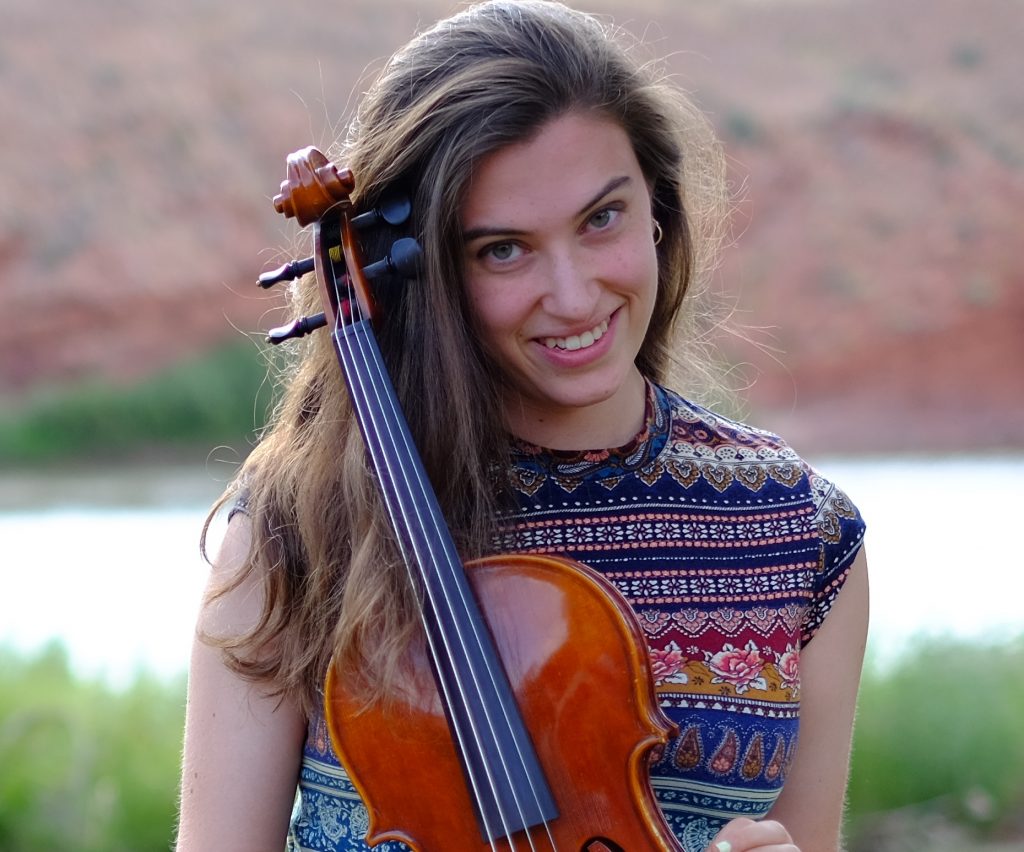Q&A with Emily Edelstein, viola
This past summer the Bowdoin International Music Festival welcomed 255 student participants from 27 countries and 30 states, including 17 remarkable Festival Fellows. Sixty-five percent of these participants received scholarship funds from the Festival. In celebration of an incredible 2016 season and in anticipation of an even better 2017 season, we’ve reached out to last year’s participants to reflect on their experience at the Festival and their lives as musicians.

Emily Edelstein, viola
BIMF: What are some of your earliest musical memories?
Emily: I attended a really wonderful family Suzuki camp every year from the age of 2 to 15. Many of my fondest musical memories are from this camp, in the White Mountains, where we sang and danced as a community in addition to learning and playing the Suzuki repertoire. It was a really supportive environment. I also remember my dad playing Paul Simon on guitar and my brother and I singing along.
BIMF: At what age did you start playing your instrument?
Emily: I started violin at three and a half because my older brother played and I wanted to be just like him. When I was 12, I found my true love, the viola. My mom wanted me and my brother to play different instruments so that there wouldn’t be a sense of competition between us. She also had a dream that I played viola and the next morning was determined for me to make the switch. It was really life-changing for me to switch to viola. I was always a violist at heart, I just didn’t know it yet.
BIMF: Does the instrument you play on have a story?
Emily: My instrument was made in 2013 by Ran Dim at William Harris & Lee in Chicago. My viola professor at school suggested I try it out, and it’s been a great asset to my playing. It’s cool to be the first person to own my instrument. I feel like I’m really creating the beginning of its story.
BIMF: What is the longest you’ve ever spent preparing a piece of music?
Emily: I feel with most repertoire that I’m never really finished, because there is always more that could be done and more options to explore. It’s always interesting to revisit rep after a number of years and interpret it in a totally different way.
BIMF: If you could play with any musician who would it be?
Emily: Janine Jansen. Her chamber music recordings are some of my favorites and playing with her seems like it would be fun.
BIMF: How would you explain your passion for chamber music to a non-musician?
Emily: I like to have a story-line, with characters and a plot, or at least an image or color that I associate with certain pieces. It helps me tap into emotions that can personalize a piece. I listen to recordings, but I find it helpful to not over-listen when I’m first learning a piece because otherwise I start subconsciously copying their interpretations.
BIMF: How do you make a well-known piece of music your own?
Emily: Playing chamber music is unlike any other feeling in the world. The connection that occurs when you’re really in sync with your group is almost spiritual. It’s the definition of a whole being more than the sum of its parts. The sacrifices that the individuals make musically and personally for the betterment of the group ultimately contributes to a magical, unified identity. Chamber music also teaches life skills, communication, respect, and sensitivity in a way that other music-making might not. It’s pretty much the most fun and gratifying thing to do in the world.
BIMF: What was one highlight of the 2016 Festival for you?
Emily: All of the concerts were absolutely fantastic. The one that stands out in my mind the most was the Ying Quartet, especially when they played the Five Pieces for String Quartet by Schulhoff. The energy in their playing was totally exhilarating. That, and when my studio all went out to Gelato Fiasco!
BIMF: What’s next for you after the Festival?
Emily: I have two more years left at Oberlin, where I’m getting my BA in Viola Performance. After school, I hope to do a combination of teaching, performing, and traveling. My dream is to somehow combine my passions for chamber music, community building, and social justice to make the world a more peaceful and connected place.
BIMF: What advice would you offer to an aspiring musician?
Emily: Music belongs out in the world, performed for other people. It’s important to practice and achieve a high level but at the end of the day it’s about making other people feel something with your music. Lastly, don’t feel like you have to follow the same path as other musicians or other people on your instrument. Music, and classical music in particular, always needs innovators; musicians who will push boundaries and create awesome new art and opportunities.
